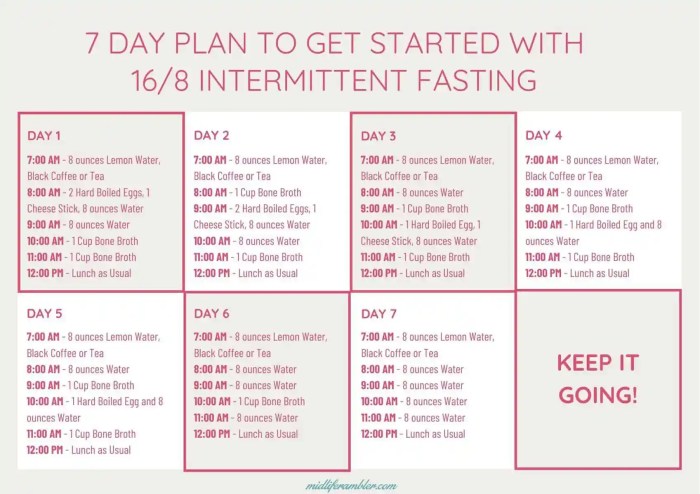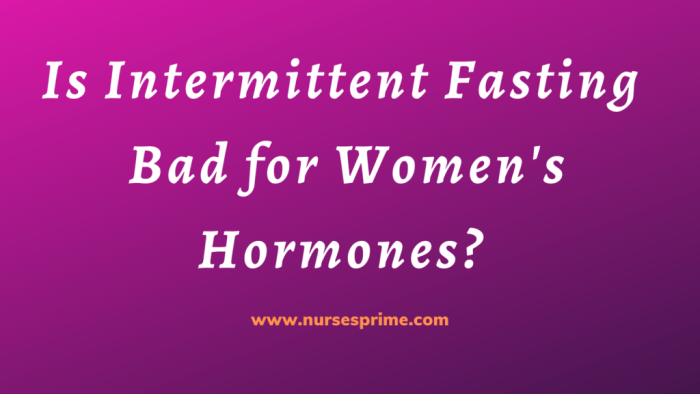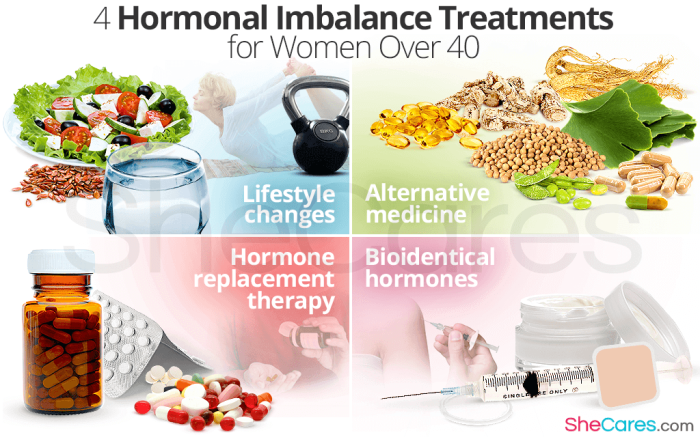Intermittent fasting for women over 40 and hormonal changes – As women over 40 navigate the hormonal shifts that accompany this life stage, intermittent fasting emerges as a promising tool to support hormonal balance and overall well-being. This guide delves into the intricacies of intermittent fasting, exploring its impact on hormonal regulation, weight management, and various aspects of health.
Introduction
Intermittent fasting (IF) is an eating pattern that involves alternating periods of fasting and eating. It has become increasingly popular in recent years, as it has been shown to offer a number of health benefits, including weight loss, improved blood sugar control, and reduced inflammation.
For women over 40, IF may be particularly beneficial. During this stage of life, women experience a number of hormonal changes that can affect their metabolism and weight. These changes can make it more difficult to lose weight and keep it off.
IF can help to offset these changes and promote weight loss.
Hormonal Changes and IF
The hormonal changes that occur during perimenopause and menopause can have a significant impact on a woman’s weight. These changes include:
- Decreased levels of estrogen and progesterone: These hormones help to regulate metabolism and appetite. As their levels decline, women may experience an increase in body fat and a decrease in muscle mass.
- Increased levels of cortisol: This hormone is released in response to stress. It can lead to increased appetite and cravings for unhealthy foods.
- Changes in thyroid function: The thyroid gland is responsible for regulating metabolism. As women age, their thyroid function may slow down, which can lead to weight gain.
IF can help to offset these hormonal changes and promote weight loss. By alternating periods of fasting and eating, IF can help to:
- Reduce insulin levels: Insulin is a hormone that helps to regulate blood sugar levels. High levels of insulin can lead to weight gain. IF can help to lower insulin levels and promote fat burning.
- Increase growth hormone levels: Growth hormone is a hormone that helps to build muscle and burn fat. IF can help to increase growth hormone levels and promote a healthier body composition.
- Reduce cortisol levels: IF can help to reduce cortisol levels and promote a more balanced hormonal profile.
Types of Intermittent Fasting: Intermittent Fasting For Women Over 40 And Hormonal Changes
Intermittent fasting is a dietary pattern that involves alternating periods of eating and fasting. There are different methods of intermittent fasting, each with its own potential impact on hormonal balance and metabolism in women over 40.
Alternate-Day Fasting
Alternate-day fasting involves alternating between a day of eating normally and a day of fasting or severely restricting calorie intake. This method may help improve insulin sensitivity and reduce inflammation, which can be beneficial for hormonal balance. However, it can be challenging to sustain over long periods.
Time-Restricted Feeding
Time-restricted feeding involves restricting eating to a specific window of time each day, typically 8-10 hours. This method may help regulate circadian rhythms and improve sleep quality, which can impact hormonal balance. It is also a more flexible approach than alternate-day fasting.
The 5:2 Diet
The 5:2 diet involves eating normally for five days of the week and restricting calorie intake to 500-600 calories on the remaining two days. This method may help promote weight loss and improve metabolic health, but it may not be suitable for everyone, especially those with certain medical conditions.
Benefits of Intermittent Fasting for Hormonal Health
Intermittent fasting is a powerful tool that can help women over 40 improve their hormonal health. By alternating periods of eating and fasting, intermittent fasting can help to regulate estrogen, progesterone, and insulin levels. This can lead to a number of benefits, including weight management, improved blood sugar control, and reduced inflammation.
Hormonal Regulation
Estrogen and progesterone are two hormones that play a vital role in a woman’s reproductive health. Estrogen is responsible for developing and maintaining female characteristics, while progesterone prepares the uterus for pregnancy. Intermittent fasting can help to regulate these hormones by increasing the production of sex hormone-binding globulin (SHBG).
SHBG binds to estrogen and progesterone, making them less available to the body. This can help to reduce the risk of estrogen-related cancers, such as breast cancer.
Risks and Considerations
Intermittent fasting can be a safe and effective way for women over 40 to improve their hormonal health. However, it’s important to be aware of the potential risks and considerations before starting an intermittent fasting regimen.
One of the biggest concerns with intermittent fasting is the potential for nutrient deficiencies. When you restrict your food intake, you may not be getting all the nutrients your body needs. This can lead to fatigue, weakness, and other health problems.
Nutrient Deficiencies
- Ensure you consume a balanced diet during your eating window.
- Consider taking a multivitamin or mineral supplement to fill in any nutritional gaps.
- Listen to your body and break your fast if you experience any adverse symptoms.
Another concern with intermittent fasting is the potential for electrolyte imbalances. Electrolytes are minerals that help regulate fluid balance in the body. When you fast, you may lose electrolytes through sweat and urine. This can lead to dehydration, fatigue, and muscle cramps.
Electrolyte Imbalances
- Drink plenty of water and electrolyte-rich beverages during your fasting window.
- Eat foods that are high in electrolytes, such as fruits, vegetables, and nuts.
- Avoid excessive exercise during your fasting window.
Finally, intermittent fasting may also lead to menstrual irregularities in some women. This is because fasting can affect the levels of hormones that regulate the menstrual cycle.
Menstrual Irregularities
- Start with a shorter fasting window and gradually increase the duration as tolerated.
- Break your fast if you experience any changes in your menstrual cycle.
- Consult with a healthcare professional if you have any concerns about menstrual irregularities.
Meal Planning and Nutrient Intake
Meal planning and nutrient intake are crucial for women over 40 practicing intermittent fasting. Let’s explore how to design a tailored plan and ensure adequate nutrition.
A balanced meal plan should prioritize nutrient-rich foods, including fruits, vegetables, lean protein, and whole grains. It’s essential to distribute these nutrients evenly throughout the eating window to maintain stable blood sugar levels and prevent overeating.
Macronutrient Balance, Intermittent fasting for women over 40 and hormonal changes
Macronutrient balance is vital. Aim for a balanced intake of carbohydrates, protein, and fats. Complex carbohydrates provide sustained energy, while protein supports muscle mass and satiety. Healthy fats promote hormone production and cell function.
Essential Nutrients
Ensure adequate intake of essential vitamins, minerals, and antioxidants. Fruits and vegetables are rich sources of vitamins and minerals, while lean protein and nuts provide essential amino acids. Antioxidants protect against oxidative stress, which can accelerate aging.
Sample Meal Plan
Here’s a sample meal plan tailored to the nutritional needs of women over 40 who are practicing intermittent fasting:
- Breakfast (within eating window):Oatmeal with berries, nuts, and Greek yogurt
- Lunch (within eating window):Grilled salmon salad with quinoa, mixed greens, and vegetables
- Dinner (within eating window):Chicken stir-fry with brown rice and steamed broccoli
- Snacks (outside eating window):Apple with peanut butter, or celery with hummus
Remember, this is just a sample plan. Adjust it based on your individual needs, preferences, and fasting schedule.
Exercise and Intermittent Fasting
Exercise and intermittent fasting can work synergistically to optimize hormonal health for women over 40. Exercise can enhance the benefits of fasting by increasing insulin sensitivity, improving blood sugar control, and reducing inflammation.
Exercise Intensity and Duration
- Moderate-intensity exercise:Ideal for most women over 40. Examples include brisk walking, cycling, and swimming. Aim for 30-60 minutes most days of the week.
- High-intensity interval training (HIIT):Involves alternating short bursts of high-intensity exercise with periods of rest or low-intensity exercise. Can be more effective for improving hormonal health than moderate-intensity exercise, but should be done under the guidance of a healthcare professional.
- Resistance training:Essential for building and maintaining muscle mass. Aim for 2-3 sessions per week, focusing on compound exercises like squats, lunges, and push-ups.
It’s important to listen to your body and adjust the intensity and duration of your workouts as needed. Avoid overexertion, especially when fasting.
Intermittent Fasting and Sleep
Intermittent fasting may impact sleep quality in women over 40. During fasting periods, the body undergoes hormonal changes that can affect sleep patterns.
Fasting can increase the production of melatonin, a hormone that promotes sleep. However, it can also lead to fluctuations in other hormones, such as cortisol and adrenaline, which can disrupt sleep.
Tips for Improving Sleep During Fasting Periods
- Maintain a consistent sleep-wake cycle, even on fasting days.
- Avoid caffeine and alcohol before bed.
- Create a relaxing bedtime routine, such as taking a warm bath or reading.
- Ensure your bedroom is dark, quiet, and cool.
- If you wake up during the night, try relaxation techniques like deep breathing or meditation.
Intermittent Fasting and Mood
Intermittent fasting may have a positive influence on mood and mental health in women over 40. It can help regulate hormone levels, reduce stress response, and improve cognitive function, all of which can contribute to improved mood and well-being.
Hormonal Regulation
Intermittent fasting can help regulate hormone levels, including estrogen and progesterone, which can fluctuate during perimenopause and menopause. Estrogen plays a role in mood regulation, and progesterone helps reduce anxiety and stress. By regulating these hormones, intermittent fasting may help improve mood and reduce mood swings.
Intermittent fasting is a great way for women over 40 to lose weight and improve their health. Hormonal changes that occur during this time can make it difficult to shed pounds, but intermittent fasting can help to regulate these hormones and make weight loss easier.
If you’re looking for a way to lose weight and keep it off, check out this article on How to lose weight over 40 and keep it off . It provides helpful tips and advice on how to make intermittent fasting work for you.
Intermittent fasting can also help to improve your sleep, energy levels, and mood, so it’s a great way to improve your overall health and well-being.
Stress Response
Intermittent fasting may also help reduce stress response. When the body is in a fasted state, it produces less cortisol, a stress hormone. This can help reduce feelings of stress and anxiety, which can contribute to improved mood.
Cognitive Function
Intermittent fasting has been shown to improve cognitive function, including memory and attention. This is because fasting can help increase levels of brain-derived neurotrophic factor (BDNF), a protein that is essential for brain health. Improved cognitive function can contribute to better mood and overall well-being.
Intermittent Fasting and Skin Health
Intermittent fasting (IF) has gained popularity as a weight management strategy, but its effects on skin health are less well-known, especially for women over 40.
As we age, our skin undergoes changes due to hormonal fluctuations, decreased collagen production, and increased inflammation. IF may impact these factors, potentially influencing skin health.
Collagen Production
Collagen is a protein that provides skin with structure and elasticity. During fasting, the body releases growth hormone, which can stimulate collagen production. This may lead to improved skin elasticity and a reduction in wrinkles.
Inflammation
Chronic inflammation can damage skin cells and contribute to premature aging. IF has been shown to reduce inflammation throughout the body, which may also benefit skin health.
Skin Aging
By improving collagen production and reducing inflammation, IF may help slow down the visible signs of skin aging. Studies have shown that IF can improve skin texture, reduce fine lines and wrinkles, and enhance overall skin radiance.
Intermittent Fasting and Hair Health
Intermittent fasting may influence hair health in women over 40. Hormones, nutrient intake, and stress management play crucial roles in maintaining healthy hair.
Hormonal Balance
Intermittent fasting may improve hormonal balance by regulating insulin and cortisol levels. Insulin resistance, common in women over 40, can lead to hair loss. Fasting helps lower insulin levels, potentially reducing hair loss.
Nutrient Intake
Fasting can affect nutrient intake, which is essential for hair health. Ensuring adequate intake of protein, vitamins (A, B, C, D, E), and minerals (iron, zinc, selenium) is crucial. Consider consulting a healthcare professional for personalized advice.
Stress Management
Intermittent fasting can aid in stress management. Chronic stress can trigger hair loss. By regulating cortisol levels and promoting relaxation, fasting may indirectly support hair health.
Intermittent fasting can be an effective weight loss strategy for women over 40 who are experiencing hormonal changes. Hormonal fluctuations can make it difficult to lose weight, but intermittent fasting can help to regulate hormones and improve insulin sensitivity. If you’re looking for the best weight loss diet for women over 40 , intermittent fasting is a great option to consider.
It can help you to lose weight, improve your health, and feel your best.
Long-Term Effects of Intermittent Fasting
Intermittent fasting has been gaining popularity as a potential strategy for improving health and well-being, especially among women over 40 who may be experiencing hormonal changes. While the short-term effects of intermittent fasting have been studied, its long-term implications are still being explored.
Intermittent fasting can be an effective tool for women over 40 who are experiencing hormonal changes and weight gain. It can help to improve insulin sensitivity, reduce inflammation, and boost metabolism. In addition, intermittent fasting can help to preserve muscle mass, which is important for maintaining a healthy weight and preventing sarcopenia.
For more information on weight loss before and after for women over 40, click here: Weight loss before and after for women over 40 . Intermittent fasting can also help to improve sleep quality and reduce stress levels, which can further contribute to weight loss and overall health.
Here’s a comparative table outlining the potential long-term effects of intermittent fasting for women over 40 and non-fasting women:
| Long-Term Effects | Intermittent Fasting | Non-Fasting |
|---|---|---|
| Weight Management |
|
|
| Hormonal Health |
|
|
| Metabolic Function |
|
|
| Overall Well-being |
|
|
End of Discussion
Intermittent fasting offers a multifaceted approach to hormonal health for women over 40. By optimizing hormone regulation, it can alleviate symptoms associated with hormonal imbalances, improve weight management, and enhance overall well-being. However, it’s crucial to approach intermittent fasting with a balanced and informed perspective, considering individual needs and consulting with a healthcare professional for personalized guidance.
Top FAQs
Is intermittent fasting safe for women over 40?
With proper planning and attention to nutrient intake, intermittent fasting can be a safe and effective practice for women over 40. It’s important to listen to your body and adjust the fasting schedule as needed.
Can intermittent fasting help with hormonal imbalances?
Yes, intermittent fasting has been shown to improve hormone regulation, including estrogen, progesterone, and insulin levels, which can alleviate symptoms associated with hormonal imbalances.
How does intermittent fasting affect weight management?
Intermittent fasting can support weight management by reducing calorie intake and promoting hormonal changes that favor fat loss.



